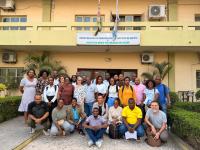Public consultation to inform the Global Strategy on Human Resources for Health

At the Sixty-seventh World Health Assembly in May 2014, the World Health Organization was requested to develop a Global Strategy on Human Resources for health, to be presented to the Executive Board in January 2016 and finally to the Sixty-ninth World Health Assembly in May 2016.
Development of the strategy
Since early 2014, the Global Health Workforce Alliance (GHWA) has been coordinating a broad-based global consultation, through the development of 8 thematic papers to collate evidence in support of the global strategy on HRH. The preliminary drafts of the papers were discussed at the GHWA Board meeting in July 2014, and revised versions of the papers will be presented at the 3rd Global Symposium on Health Systems Research in Cape Town later this month.
GHWA will utilize these papers to provide recommendations to WHO, as a foundation for the development of the global strategy. WHO will use the recommendations from GHWA to inform the deliberations by its Member States. For more information on the rationale and the process in developing the Strategy please refer to our "Information flyer”:
E-consultations
To ensure that the views and contributions of all interested stakeholders are considered in the development of the global strategy on HRH, GHWA is inviting feedback on the 8 thematic papers from all relevant organizations, institutions, networks, civil society groups. We are also soliciting feedback on an additional paper (public health) developed through a separate process, not linked to the GHWA oversight and coordination mechanisms, but its contents can be of relevance to the broader discussions on the Global Strategy.
Timeframe and submission guidelines
This online consultation will be held between 24 September and 16 November 2014. Feed-back can be sent either through the GHWA member’s "platform” or via email toghwa@who.int
In submitting your comments, please indicate your name, job title and organization, and which of the papers your comments refer to (eg: Ref –# 1). You may also submit general or cross-cutting comments not linked to any particular paper.



